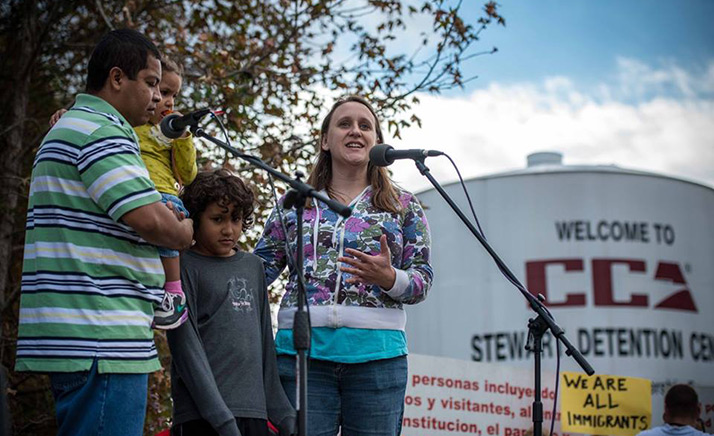Financial incentives drive the continuation and expansion of our immigration detention system

Financial incentives are the bedrock of our current immigration detention system. Local governments detain immigrants in exchange for huge sums of money, attempting to fill gaps in shrinking local budgets. Private prison companies run entire facilities. Other private companies provide a myriad of services inside the facilities. At every turn, there are clear incentives to detain more people while always reducing per-person costs—a combination that has helped create a sprawling, abusive, and unaccountable system of mass detention.
Private prison companies are one of the biggest beneficiaries of the current immigration detention system. The best-known companies are The GEO Group, Inc. (GEO) and CoreCivic (formerly the Corrections Corporation of America (CCA)), although there are a handful of other smaller companies as well. Together they administer—and profit from—the detention of 81 percent of people detained in ICE custody. This is a significant expansion since 2009 when they operated 49 percent of detention beds. In fact, as the entire system has expanded, private prison companies have consolidated their dominance.
The executive order issued by President Biden in January 2021 phasing out federal private prisons, failed to include privately operated ICE detention centers. In some cases this has led to ICE negotiating contracts with private prison companies to keep federal prison contracts privatized and repurposed for immigration detention. For more on how private prisons cycle between criminal, immigration, federal and local detention see Carceral Carousel.
For years, some of these companies—most successfully GEO—have further entrenched their profits by negotiating guaranteed minimums, or local quotas, into their contracts. For more information about this form of corporate welfare, see Detention Quotas.
Other private companies, though less well known, also make significant profits each year off immigration detention. They provide medical, transportation, security, food and other services within the facilities. Often, there are layers of contracting between the federal government and these service providers, making them even more difficult to track or hold accountable.
As the profit motive of private companies has garnered more attention, advocates and lawmakers have been successfully pressuring lenders to terminate financial ties with prison corporations. However, the corrupting financial incentives for local governments are intertwined and no less worrying. After receiving a federal contract, some local governments in turn subcontract the operation of the facility to a private prison company, perpetuating the cycles described above. Other local governments see the detention centers as an important source of jobs in struggling rural towns, despite exploitative work programs that force detained people to perform much of the work inside detention facilities in order to keep costs down and findings that ICE detention contracts have not generated long-term revenue for local governments.
Overall, the pervasive influence of financial incentives for both private companies and local governments has had a disastrous effect. It both feeds and further entrenches an unjust system. Worse, it views immigrants primarily as sources of income rather than as human beings, paving the way for other abuses. Communities across the country are arguing that rather than profiting from the imprisonment of immigrants, local economies can be bolstered by investments in education, housing, and healthcare that benefit everyone -- strengthening the community as a whole.
Learn More About Financial Incentives
- Detention Watch Network and Project South Report
Broken Promises: Limits of Biden’s Executive Order on Private Prisons - Detention Watch Network Report: Communities Not Cages: A Just Transition from Immigration Detention Economies
- Detention Watch Network Report
A Toxic Relationship: Private Prisons and U.S. Immigration Detention - Detention Watch Network Report
The Influence of the Private Prison Industry in Immigration Detention (2011)
